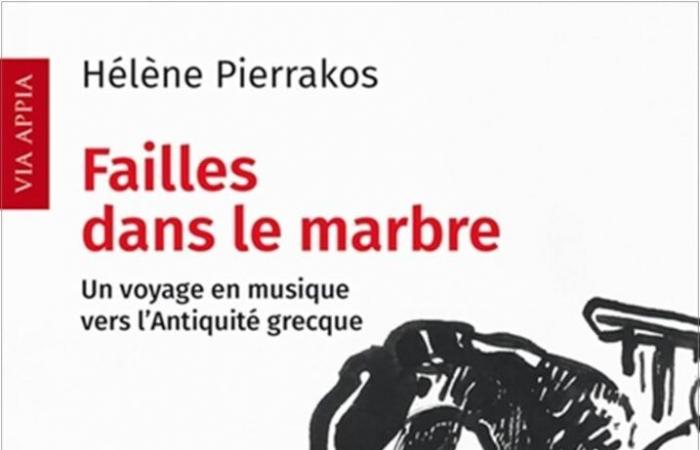More details
Faults in the marble, a musical journey to Greek Antiquity. Helene Pierrakos. Editions Premières Loges. 133 pages. €16. July 2024.
It is through a strong identity of style of writing, marked as much by sensitive poetry as by manifest erudition, that the author of Faults in the marble – A musical journey to Greek Antiquity, Hélène Pierrakos, uniquely depicts Greek Antiquity set to Music.
The very essence of the approach of this excellent essay is summarized by Hélène Pierrakos herself: “Music is a territory of strangeness, its message is fleeting by nature, its meaning always hypothetical, its interpretation subject to infinite variations. » While the chosen theme of the treatment in music of Greek Antiquity is widely discussed in the world of musicology, the subject could even be that of a dissertation for obtaining the aggregation or even Capes competition, the The author brings a surprising perspective through her new and original approach. Proof of this is the almost absence of footnotes or past references, consistent with the unique outlook of this work.
Theme chosen in connection with her origins, Hélène Pierrakos brings a true musicologist’s perspective, fine and sensitive as well as scholarly, however the opposite of what she states in the epilogue (“…the ever-present temptation to let erudition to scholars, to let myself be inspired by the scent of music”), proving through these 133 pages that knowledge is not antithetical to the delicacy of a feeling.
Even if Hélène Pierrakos ventures into the world of madrigals and lieder, particularly in the chapter “Une jeunesse du monde” (Chapter 3), it is indeed the world of opera that predominates, the chronological organization of the analysis offering a brief history of music through the Hellenic conception of composers. The first chapter “A Greek Listening to Monteverdi” is thus mainly devoted to The Orpheus et The Return of Ulysses to his Homeland, Greek Antiquity being the main ally of the birth of opera. “The Spirit of Dance” (Chapter 2) is dedicated to Gluck, notably through the choreographic staging of Pina Bausch. Richard Strauss goes “From astonishment to metamorphosis” (Chapter 4), while the Debussy transcriptions of “Paysages” enhance this musical analysis written from the perspective of a listener rather than a researcher or professional of the music, while Benjamin Britten, “Faces of Apollo” (Chapter 6), concludes the text.
However, it is to professionals and enlightened amateurs that this essay will be most profitable, the work of Hélène Pierrakos certainly being able to serve as the basis for a new approach to interpretation or staging. The demanding and detailed reading reveals an approach full of intelligence and finesse, like that of the Lament of the Nymph of Monteverdi’s madrigal (p.35-36) or the explanation of the “primitive syllabary” ofElectra by Strauss, two seconds and three notes! (p. 85-86) The acuity of the gaze is also found in the reading of Wolf’s song Ganymede where the composer “signals with wonderful subtlety the vanity of desire rather than exaltation”.
The author sometimes relies on first-hand sources to obtain the key to understanding (Letter about Ariadne from Hofmannsthal to Strauss), on solid musical analyzes like that made on Strauss’s choral singing compared with Daphne’s consciousness (p.108), or even refers to contemporary stagings such as than that ofIdomeneus in Munich in July 2021. Despite her common thread, Hélène Pierrakos leaves, with moderation, the Greek dimension in the background (the Songs of Bilitis, Debussy triptych inspired by supposedly Greek poems), in favor of other secondary themes such as Nature with Orpheus and Eurydice. The art of composition is traced marvelously, particularly for Schubert (p.80), the conception of the operas mentioned becoming almost sacred (without religious connotation) so elaborate is the analysis, with for example the “secret rhythmicity” of Gluck (p.48). It is even a supernatural echo between him and Mozart that the author highlights by connecting Idomeneus has Iphigenia in Tauride (p. 56).
Special mention, if one were needed, to the quality of the prologue explaining the title Faults in the marble which we let the future reader delight in with relish.
(Visited 1 times, 1 visits today)
More details
Faults in the marble, a musical journey to Greek Antiquity. Helene Pierrakos. Editions Premières Loges. 133 pages. €16. July 2024.
Front rows
Keywords of this article






